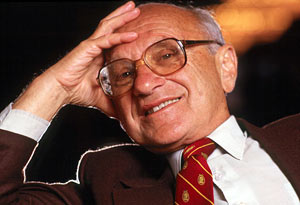|
|
||||||
 |
| About sponsorship |
| |
 | |
IF YOU had to describe Milton Friedman with a single adjective—not an easy task—you could do worse than “tireless”. Until his death, at the age of 94 on November 16th, the American economist was still penning sharply worded newspaper articles on the merits of the free market. He was also involved in a television documentary to spread the word, a quarter of a century after his series, “Free to Choose”. Clearly, Mr Friedman thought he still had a lot of work to do. He was right.
This may seem a strange epitaph for the most influential economist of the past half-century (see article). When Mr Friedman was attacking the growth of the state and trumpeting freedom of choice 50 years ago, few listened; now many do. Ideas that once seemed daft—ending peacetime conscription, deregulating industries from transport to banking, the negative income tax, school vouchers—have become either reality or part of mainstream political discourse. And his impact was probably greatest in places where non-economists might not spot it: largely thanks to him, governments no longer believe they can buy permanently lower unemployment at the price of a little more inflation.
You could even be forgiven for thinking that the whole world had been remade in Mr Friedman's image. Communism no longer rules half of Europe. Even in China and Vietnam capitalism has taken hold. Politicians of left and right speak of the power, and sometimes of the virtues, of market forces. No wonder those forces are so often held to be untrammelled, unfettered or merely triumphant from Seattle to Shanghai.
And yet, and yet. The Doha round of trade talks is in tatters, because farm protection is still too precious. Politicians in both Europe and America continue to blanch at foreign takeovers. For the big picture, take the most obvious measure of the size of the state, the ratio of government spending to GDP. Since 1989, the year Ronald Reagan, the American president most in tune with Mr Friedman's ideas, left office, and the Berlin Wall came down, America's government has grown just as fast as its economy—an economy which has barrelled along for much of that time. The state's slice of GDP is forecast to be 36.6% in 2006, up from 36.1% 17 years ago. The public sector has also swollen in Europe's three biggest economies—Britain, France and Germany—and in OECD economies as a whole. Governments are as convinced as ever that they know best how to spend their citizens' money.
Education is a case in point, not least in Mr Friedman's homeland. For many years he argued that parents should be given more choice in how and where their children are schooled. The government, he said, should not spend money on their behalf, but should give them vouchers that they could spend on the education they thought best. Competition between schools would do more than any amount of bureaucratic direction to raise the often woeful standards of American primary and secondary education. This newspaper has long subscribed wholeheartedly to the idea of school vouchers. They are making headway, but too slowly, blocked by the teachers' unions (when did state-protected producers ever embrace competition?) and sometimes in court.
“Judged by practice,” wrote Mr Friedman and his wife, Rose, in their memoirs, published eight years ago, “we have been, despite some successes, mostly on the losing side. Judged by ideas, we have been on the winning side.” As summaries go, that is hard to beat. Those of liberal spirit, including The Economist, have plenty to thank Mr Friedman for—and, sadly, an enormous amount still to do.
|
Copyright © 2006 The Economist Newspaper and The Economist Group. All rights reserved. |